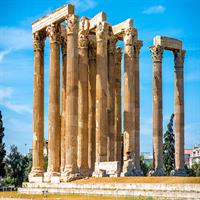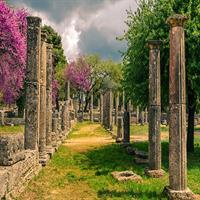Day 1 in Olympia
Welcome to the small town of Olympia, the
birthplace of the Olympic Games. Upon
arrival, make your transfer to your destination, arrive at your hotel, check in
and do not give in to jet lag! There is so much for you to see and do.
Once you have checked
into your hotel, grab a bite to eat and then head out for your day of
sightseeing. There are a number of sites and museums you can explore once you
arrive: the Archaeological Museum of Olympia, the Archaeological
Site itself, the Museum of the History of the Olympic Games
in Antiquity and the Museum of the History of Excavations in
Olympia.
The modern village
of Olympia (confusingly known as Ancient Olympia) is divided by its
one main street, Leoforos Kondili. The town has the usual
assortment of tourist shops selling jewelry, T-shirts, and reproductions of
ancient pottery and statues, as well as more than a dozen hotels and
restaurants. While in this part of town, we recommend you pay a visit to the small Museum of the Olympic Games.
This museum is the closest to the main road, making it a perfect first stop.
The Museum of the Olympic
Games contains numerous art, statues, paintings and other ancient works
depicting the athletes, as well as information on the history and beginning of
the games at Olympia in the 8th century BC. The museum shares
different tales of how the games began, as well as the glory and fame
surrounding Olympic champions, their prizes and the sacrifices to Zeus that
were made followed by celebratory banquets when the champions returned to their
cities.
After getting your bearings of the town, grab some dinner before heading
back to your hotel for a restful night sleep.
Tip: Check on the admission hours for both the
site and museum as soon as you arrive. The actual open hours fluctuate from the
official hours more than one would expect.



Day 2 in Olympia
Wake up early today to visit the Ancient Olympus Site, an entire day should be
reserved only for this. This archeological
site has remains of homes, fields and more than 70 structures from ancient
Greece, dating back to 4,000 years AD. The extensive
ruins include athletic training areas, a stadium and temples dedicated to the
gods Hera and Zeus. Some of the highlights that are must-sees in Ancient
Olympia: The Museum of the Olympic Games, Temple of Zeus, Tempe of Hera,
Palaestra and The Stadium.
Note:
Several tours are available and we would highly recommend getting a guide to
visit the area since just walking around with no indications can be hard to
understand what was there and what the site was used for. There are a few
explanation panels here and there but with so little information on each one.
If you do choose to do a self-guided tour, the best way would be to buy a
guidebook and explore it at your own pace.
The original incarnation
of the Olympic Games lasted until 393 AD, when Roman Emperor Theodosius I
abolished them as part of his mission to introduce Christianity to Greece.
Temples were ransacked and centuries of earthquakes and floods finished off
what was left of Olympia. By the time the site was rediscovered in the 18th century
it was covered in 25 feet worth of silt and parts of the site are still being
excavated.
The Olympic site was a
whole self-contained town, with its own temples, accommodation block,
bathhouses and public buildings. (Similar to the athletes` village of today`s
Olympics.) Except that the heart of it then was The Temple of Zeus.
This was Olympia`s most important building and housed one of the seven wonders
of the ancient world. The Statue of Zeus was a giant, 42-ft-high, gold and ivory statue of Zeus
on his throne. It`s long gone now and there`s not much left of the temple
either, but one column was reconstructed for the 2004 Athens Olympics to give a
sense of its size. The ruins across the site have been heavily damaged so you
have to use your imagination as you walk through piles of stone and crumbling
pillars scattered amongst the olive trees to see them as a temple or gymnasium.
The best-preserved statues, carvings and relics from the site are on show in
the archaeological museum next door.
The site of the Olympic stadium that you see
today was built in the 5th century BC, though underneath it are remains of
older stadiums right back to the original. It`s not what you`d think of as a
stadium today, but more like a field with a dirt rectangle in the center. But
it could hold up to 45,000 spectators - a bit over half as many as the stadium
for the London 2012 Olympics, to put this in perspective. Though it was a lot
less comfortable, did not have seats or entrance to women.
Your admission ticket also includes the two museums
located in the Ancient Olympus Site. The Archaeological Museum of Olympia is one of the most
important museums in Greece. This museum presents the long history of the most
celebrated sanctuary of antiquity, the sanctuary of Zeus, father of both gods
and men, where the Olympic Games were born. The museum`s permanent exhibition
contains finds from the excavations in the sacred precinct of the Altis dating
from prehistoric times to the Early Christian period.
After a long day of exploring, head to dinner before getting
back to your hotel for a good night`s rest. Note that if you are dining in
Olympia, it is filled with tourists, overly priced and not serving a true
representation of Greek food. If you have the time, find more authentic
restaurants off the beaten path.




Additional Days in Olympia
Should you be able to spend additional days in Olympia plan to enjoy some of the festivals and cultural events that take place in town (usually in the summer months). Due to the historical importance of this site, many visitors attend these festivals that take place in the archaeological site of Olympia. The Festival of Ancient Olympia lasts from July to August and events usually take place in the Floka Theatre, a few miles from Olympia. These events include musical concerts, theater performances and lectures. The International Film Festival for Children and Young People takes place in December in various venues of Olympia and Pyrgos.

Your Last Day in Olympia
Depart your hotel for the train station where you will head home or make your way to more Greece adventures. Savor the memories of a very special time in Olympia.
